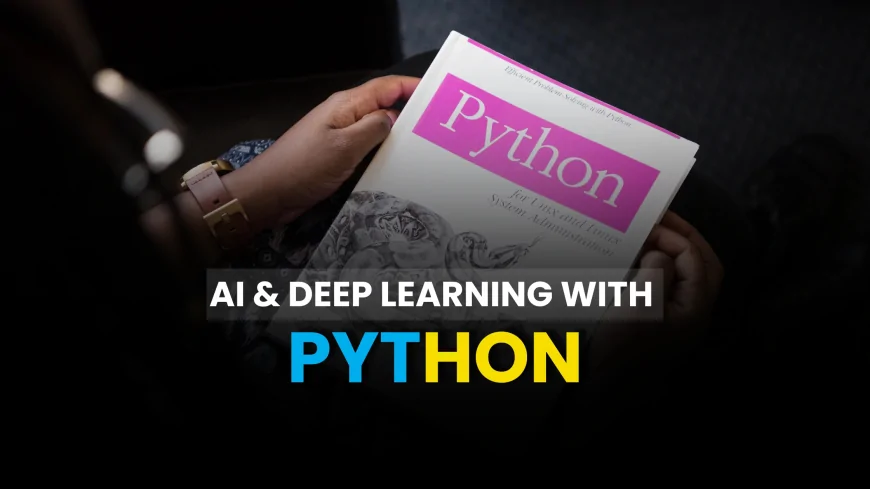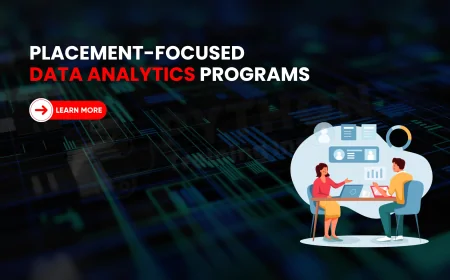AI and Deep Learning with Python Course Pune | AI and Deep Learning Projects with Python
Join the best AI and Deep Learning with Python Course in Pune. Learn TensorFlow, Keras, NLP & real-world AI projects. Online & offline batches.

Table of Contents
- Course Overview
- Why Python for AI & Deep Learning?
- What You Will Learn
- Frameworks Covered
- Real-Time Projects
- Who Can Join This Course?
- Top Institutes Offering This Course in Pune
- Course Duration and Fees
- Certification and Career Path
- FAQs
- Conclusion
Course Overview
The AI and Deep Learning with Python course in Pune focuses on core concepts like artificial neural networks, convolutional neural networks (CNN), recurrent neural networks (RNN), natural language processing (NLP), and deep learning model deployment. With hands-on labs, industry-grade datasets, and experienced mentors, learners build practical skills that help them transition into job roles like AI Engineer, Data Scientist, or Machine Learning Developer.
Why Python for AI & Deep Learning?
Python is the backbone of modern Artificial Intelligence and Deep Learning development—and for good reason. Its simplicity, flexibility, and massive ecosystem of scientific libraries make it the top choice among AI researchers, data scientists, and ML engineers worldwide.
Key Reasons Python Dominates AI & Deep Learning:
- Easy-to-Read Syntax: Python’s clean and intuitive syntax reduces development time, helping developers focus more on algorithms and logic than complex syntax rules.
- Extensive AI Libraries: Python supports industry-standard AI and DL libraries like TensorFlow, Keras, PyTorch, Scikit-learn, NumPy, Pandas, OpenCV, and NLTK, simplifying model development, training, and deployment.
- Community and Support: A vast global developer community provides extensive documentation, tutorials, and open-source projects, making Python a learning-friendly language for beginners and professionals alike.
- Platform Independence: Python runs seamlessly on Windows, Linux, and macOS, and integrates well with cloud platforms like AWS, GCP, and Azure for AI deployment.
- Visualization Tools: Python offers powerful visualization libraries like Matplotlib, Seaborn, Plotly, and TensorBoard to help analyze data and track training progress.
- Interoperability: Python integrates easily with other languages and systems, allowing it to be used alongside Java, C++, REST APIs, and big data frameworks.
In essence, Python empowers developers to build, test, and deploy AI models faster and more effectively, whether you're creating computer vision solutions, NLP applications, or deep learning models for autonomous systems.
What You Will Learn
- Python for data science (NumPy, Pandas, Matplotlib)
- Supervised and unsupervised machine learning algorithms
- Introduction to deep learning concepts
- Artificial neural networks (ANN)
- Convolutional neural networks (CNN) for image processing
- Recurrent neural networks (RNN) and LSTM for sequence modeling
- Natural language processing (NLP) with Python
- Model evaluation, optimization, and hyperparameter tuning
- Deploying models using Flask, FastAPI, or cloud platforms
Frameworks Covered
- TensorFlow – Google's framework for scalable deep learning
- Keras – High-level neural network API
- PyTorch – Facebook’s research-grade deep learning library
- Scikit-learn – Traditional ML models and evaluation
- OpenCV – Computer vision library
Real-Time Projects
- Image classifier using CNN on medical or fashion datasets
- Text classification using RNN on product reviews or sentiment analysis
- AI-powered chatbot using NLP and neural networks
- Face detection and recognition using OpenCV
- Model deployment using Streamlit, Flask, or Google Colab
Who Can Join This Course?
- Students and recent graduates in Computer Science or Engineering
- Software developers and testers looking to transition into AI roles
- Data analysts and BI professionals
- Anyone with basic Python knowledge wanting to enter AI and ML domains
Top Institutes Offering This Course in Pune
Why WebAsha for AI & Deep Learning with Python?
- Industry-Aligned AI & ML Curriculum: Covers Python, TensorFlow, Keras, PyTorch, NLP, CNN/RNN, reinforcement learning, and deployment using Flask or cloud platforms.
- Experienced Faculty: Trainers with real-world AI deployments who offer project-based learning and mentorship.
- Hands-On Projects: Work on practical AI systems including image classifiers, NLP models, chatbot agents, and computer vision applications.
- Flexible Batches: Options for weekend, weekday, online, and offline classes with practical lab sessions and recorded lectures.
- Strong Placement Assistance: 100% assistance featuring resume crafting, mock interviews, alumni networks, and placement portal access with ~90% placement record.
- Certifications & Recognition: Industry-recognized certificates and optional prep for global credentials like TensorFlow Developer and IBM AI Engineer.
Course Highlights and Structure
- Duration: 4–6 months (3–6 month diploma and intensive AI bootcamps).
- Mode: Live classroom (Pune) & live online sessions, with lab access and hybrid flexibility.
- Tools & Technologies: Python, NumPy, Pandas, Matplotlib, Scikit-learn, TensorFlow, Keras, PyTorch, OpenCV, NLP toolkits.
- Project Domains: Healthcare, finance, robotics, image recognition, NLP, reinforcement learning.
Who Should Enroll?
- Beginners in AI & ML aiming for robust project-based learning
- Software developers and data analysts aspiring to move into AI engineering
- Students, working professionals, or career switchers looking for hands-on model deployment skills
Course Duration and Fees
- Duration: 6 to 12 weeks (flexible weekend & weekday batches)
- Mode: Classroom, Live Online, or Hybrid
- Fees: ₹18,000 – ₹40,000 depending on institute and level (beginner/advanced)
Certification and Career Path
On successful completion, candidates receive a recognized certificate. Many institutes also help students prepare for global certifications like:
- TensorFlow Developer Certificate
- IBM AI Engineer Professional Certificate
- Google Cloud AI/ML Certification
Career Paths: AI Engineer, ML Developer, Data Scientist, AI Research Associate, Deep Learning Engineer, NLP Engineer
FAQs –
1. Is Python necessary for AI and Deep Learning?
Yes, Python is the most widely used programming language in AI and deep learning due to its simplicity and powerful libraries.
2. Can I join this course without a computer science background?
Yes, many institutes offer beginner-friendly AI courses that only require basic Python and logical thinking skills.
3. Which is better – TensorFlow or PyTorch?
Both are excellent. TensorFlow is preferred for deployment and scalability; PyTorch is often favored in research and academic settings.
4. Will I get job assistance after this course?
Yes, most reputed institutes in Pune provide resume help, mock interviews, and placement assistance after the course.
5. Are weekend classes available?
Yes. Weekend and evening batches are available for working professionals.
6. What projects will I build during this course?
You’ll work on projects like image classification, text sentiment analysis, facial recognition, and chatbot development.
7. Do I need to learn math for this course?
Basic understanding of linear algebra, probability, and calculus helps, but practical knowledge is more important initially.
8. What is the course fee in Pune?
It ranges from ₹18,000 to ₹40,000 depending on the institute, course level, and delivery mode.
9. Can I take this course online?
Yes. Most top Pune-based institutes now offer live online training with recordings and support.
10. Will I receive a certificate?
Yes. You will get an industry-recognized certificate from the training institute upon completion.
11. How long is the course?
The average duration is 6–12 weeks, depending on whether you choose a fast-track or regular batch.
12. Do I need a GPU laptop to learn deep learning?
No, cloud platforms like Google Colab provide free GPU environments for training deep learning models.
13. Is there any placement support?
Yes, institutes like WebAsha offer placement services and job referrals.
14. Will I learn about NLP?
Yes. NLP and text analytics are key parts of this course, including projects like sentiment analysis and chatbot development.
15. What if I miss a class?
Most training providers offer recorded sessions or allow you to attend the missed topic in another batch.
16. Are these certifications recognized by companies?
Yes. Certificates from reputed training centers and projects on GitHub help boost your portfolio.
17. Will I learn how to deploy AI models?
Yes, you'll be taught how to deploy models using Flask, Streamlit, or on cloud platforms.
18. Are real-time projects included?
Absolutely. Project-based learning is a core part of AI training programs in Pune.
19. Can I take this course while working a full-time job?
Yes. Many institutes offer flexible weekend, late evening, or self-paced options.
20. What’s the average salary after completing this course?
Entry-level AI engineers in Pune earn ₹5L–₹10L per year, and experienced professionals can earn ₹15L+ with the right skillset.
Conclusion
The demand for skilled professionals in artificial intelligence and deep learning is growing exponentially. With Python as your foundation and real-world AI models in your portfolio, you stand at the forefront of tech innovation. Pune’s leading training institutes offer structured, hands-on AI courses that not only teach theory but also prepare you for deployment and production-level challenges.
Whether you're a beginner or an experienced developer, investing in a Python-based AI & Deep Learning course in Pune could be the most strategic decision of your career.
What's Your Reaction?
 Like
0
Like
0
 Dislike
0
Dislike
0
 Love
0
Love
0
 Funny
0
Funny
0
 Angry
0
Angry
0
 Sad
0
Sad
0
 Wow
0
Wow
0















